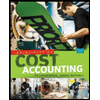
a.
Calculate the anticipated level of profit for the expected sales volume.
a.
Answer to Problem 65P
The anticipated level of profit for the expected sales volume is $1,110,000.
Explanation of Solution
Target volume: the level of sales which need to be achieved during a particular period of time is termed as target volume.
Target profit: the amount of profit which needs to be achieved during a particular period of time on a particular level of sales is termed as target profit.
Contribtuion margin:
| Particulars | Individual | Corporation | |
| Selling price per unit | $200 | $1,000 | 2000 |
| Less : variable cost per unit | $180 | $900 | 1800 |
| Contribution | $20 | $100 | $200 |
| Expected sales (unit) per year | 60,000 | 4,000 | 16,000 |
| Fixed cost | $3,690,000 | ||
Table: (1)
Compute the the anticipated level of profit for the expected sales volume:
Compute the profit level:
Thus, the anticipated level of profit for the expected sales volume is $1,110,000.
Working note 1:
Compute the total revenue:
Working note 2:
Compute the total variable cost:
b.
Assuming that the product mix is the same at the break-even point, compute the break-even point.
b.
Answer to Problem 65P
Company S must sell 46,125 tax returns of individual, 3,075 tax returns of partnership and 12,300 tax returns of corporation every year to break-even.
Explanation of Solution
Breakeven point (BEP): The breakeven point or BEP is that level of output at which the total revenue is equal to the total cost. The BEP means there are no operating income and no operating losses. The management keeps an eye on the breakeven point in order to avoid the operating losses in order to avoid losses.
Sales mix: This refers to the relative proportions in which a company’s products are sold. Sales mix is computed by expressing the sales of each product as a percentage of total sales.
Compute the individual tax returns that must be sold by Company S every year to break-even:
Compute the partnership tax returns that must be sold by Company S every year to break-even:
Compute the corporation tax returns that must be sold by Company S every year to break-even:
Thus, Company S must sell 46,125 tax returns of individual, 3,075 tax returns of partnership and 12,300 tax returns of corporation every year to break-even.
Working note 3:
Compute the combined break-even point:
Working note: 4
Compute the weighted-average contribution margin:
| Particulars | Sales mix (a) | Contribution (b) | Weighted average contribution margin (a*b) |
| Individual | 75%(5) | $20 | $15 |
| Partnership | 5%(5) | $100 | $5 |
| Corporation | 20%(5) | $200 | $40 |
| The combined weighted average contribution | $60 | ||
Table (2)
Working note: 5
Calculations of sales mix (weight):
Compute the individual mix:
Compute the partnership mix:
Compute the corporation mix:
c.
Calculate the new break-even volume for Company S If the product sales mix was to change to nine Individual-style bags for each Partnership style bag.
c.
Answer to Problem 65P
Company S must sell 27,000 tax returns of individual, 4,500 tax returns of partnership and 13,500 tax returns of corporation every year to break-even.
Explanation of Solution
Breakeven point (BEP): The breakeven point or BEP is that level of output at which the total revenue is equal to the total cost. The BEP means there are no operating income and no operating losses. The management keeps an eye on the breakeven point in order to avoid the operating losses in order to avoid losses.
Compute the individual tax returns that must be sold by Company S every year to break-even:
Compute the partnership tax returns that must be sold by Company S every year to break-even:
Compute the corporation tax returns that must be sold by Company S every year to break-even:
Thus, Company S must sell 27,000 tax returns of individual, 4,500 tax returns of partnership and 13,500 tax returns of corporation every year to break-even.
Working note 6:
Compute the combined break-even point:
Working note 7:
Compute the weighted-average contribution margin:
| Particulars | Sales mix (a) | Contribution (b) | Weighted average contribution margin |
| Individual | 60% | $20 | $12 |
| Partnership | 10% | $100 | $10 |
| Corporation | 30% | $200 | $60 |
| The combined weighted average contribution | $82 | ||
Table (3)
Want to see more full solutions like this?
Chapter 3 Solutions
Gen Combo Fundamentals Of Cost Accounting; Connect Access Card
 Intermediate Financial Management (MindTap Course...FinanceISBN:9781337395083Author:Eugene F. Brigham, Phillip R. DavesPublisher:Cengage Learning
Intermediate Financial Management (MindTap Course...FinanceISBN:9781337395083Author:Eugene F. Brigham, Phillip R. DavesPublisher:Cengage Learning Principles of Cost AccountingAccountingISBN:9781305087408Author:Edward J. Vanderbeck, Maria R. MitchellPublisher:Cengage Learning
Principles of Cost AccountingAccountingISBN:9781305087408Author:Edward J. Vanderbeck, Maria R. MitchellPublisher:Cengage Learning Financial Reporting, Financial Statement Analysis...FinanceISBN:9781285190907Author:James M. Wahlen, Stephen P. Baginski, Mark BradshawPublisher:Cengage Learning
Financial Reporting, Financial Statement Analysis...FinanceISBN:9781285190907Author:James M. Wahlen, Stephen P. Baginski, Mark BradshawPublisher:Cengage Learning



